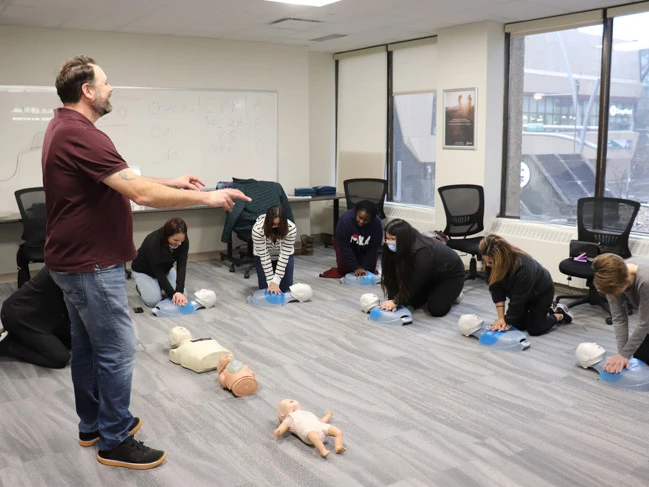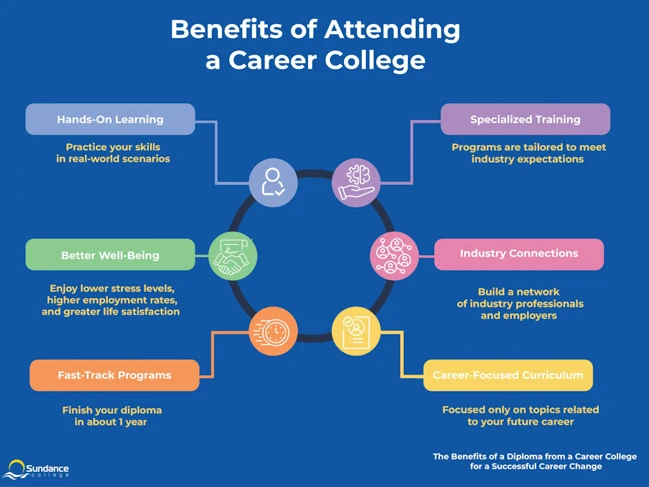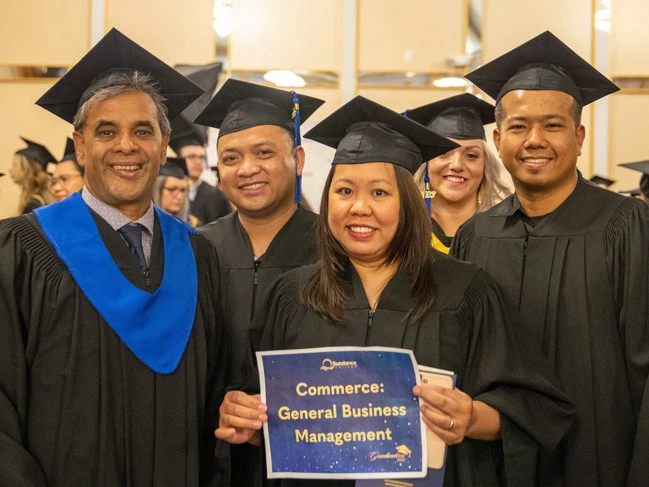Blog / The Benefits of a Diploma Career College for a Successful Career Change
The Benefits of a Diploma Career College for a Successful Career Change

Explore our Diploma Programs
- Business, Hospitality, and Legal
- Health and Human Services
- Technology
Table of Contents
In today’s fast-paced and ever-evolving job market, many individuals find themselves contemplating a career change at some point in their professional journey. Whether it’s a desire for greater fulfillment, increased job prospects, or a shift in personal interests, embarking on a new professional path can be exciting – or it can be daunting.
A crucial factor to keep in mind is that a successful career transition often requires augmenting or upgrading your existing skills or learning new ones. A shift without sufficient preparation or training will likely lead to roadblocks. Securing a diploma from a career college can provide you with a significant advantage. This formal education can greatly enhance your chance of starting anew because it equips you with the tools and qualifications sought by employers in your prospective field.
Let’s look at the numbers: According to Statistics Canada, in 2022 the employment rate of adults aged 25 years and over with a diploma from a career college was more than twice as high as those without it.
While other learning avenues, such as on-the-job experience, online tutorials, or volunteering, provide useful knowledge, they may not fully equip you for a successful career change in the way that formal education can.
Whatever field – business and legal, health and social services, or technology – you choose to launch a new career in, earning a diploma from a career college could be your go-to option. And in this article, we’ll explain why.
Read on to find out the benefits of attending a career college, how it can help you pursue a successful career change, the most popular diploma programs for a career change, and the results our graduates have been achieving with the guidance of the Sundance College team.
What is a Diploma Career College?
To begin, let’s establish what a career college is and what differentiates a career college from a traditional college.
A career college, also known as a diploma college, is a career-focused educational institution that offers specialized training programs designed to prepare students for specific career paths. Unlike traditional degree programs, career college programs are typically shorter in duration, spanning approximately one year. This provides a condensed and focused learning experience.
At a career college, the emphasis lies on cultivating high-demand skills, industry-specific knowledge, and hands-on experience. Unlike traditional colleges it does not include electives which, while they may be interesting, are unrelated to the career you are pursuing – and they make your program longer than it needs to be. Career college programs are streamlined to exclude unnecessary coursework, ensuring a more efficient path towards professional readiness. This deliberate focus on relevant and applicable skills means the diploma program is not unnecessarily prolonged, allowing students to swiftly acquire the needed knowledge and abilities to start their new careers as soon as possible.
By recognizing the distinction between career colleges and traditional colleges, we can better appreciate the unique advantages that a career college diploma brings to individuals seeking a successful career change.
Benefits of Attending a Career College
Curious about the benefits a diploma from a career college offers to students who are looking to start or advance their careers? Let’s look at the key advantages of choosing a career college as your educational pathway:
Hands-On Learning
Diploma colleges emphasize hands-on learning, giving students an opportunity to practice their skills in real-world scenarios. This approach equips students with competence in their field, enabling them to enter the workforce well-prepared for the demands of their chosen profession. The significance of hands-on training is especially important in health and social services professions, such as pharmacy assistants, community service workers, and medical office assistants.
For example, the Sundance College Addictions & Community Health Professional program requires First Aid & CPR Certification, which is hands-on, in-person training under the supervision of qualified instructors. Additionally, Addictions and Community Health students gain valuable experience by working with vulnerable populations during a 7-week practicum placement.

Specialized Training
Career colleges provide specialized training tailored to meet industry standards and expectations. This ensures that graduates are job-ready and have the skill sets and knowledge employers are seeking.
To illustrate, in the Accounting, Tax, and Payroll Diploma Program. Our students learn how to use the computerized accounting programs they’ll use in their field, such as QuickBooks. Students practice real-world skills; entering income and expenses, clients, suppliers, and invoicing. By learning how to use specialized software from instructors who are experienced in the financial field, our students graduate prepared for their first day at an accounting firm.
Industry Connections
Diploma colleges often establish strong relationships with industry professionals and employers, offering students valuable networking opportunities and access to job openings.
This is beneficial for both sides: for those looking to make a career change, a career college helps break down the walls into a new field without established connections. For employers with vacancies to fill, word-of-mouth recommendations and endorsements make it easier to identify qualified workers and find a good fit for their organization.
To provide this win-win solution, Sundance College has established partnerships with a wide range of employers for each of our diploma programs. We assist our students with finding practicum placements in their field – and many of these arrangements result in job offers after graduation!
For example, Kris, a graduate of our Medical Office Administration Program, was offered and accepted a job offer from the clinic in which she completed her practicum!
Career-Focused Curriculum
A key advantage of career colleges is the alignment of the curriculum with the specific career that students aim to pursue. Often, four-year programs require students to take general introductory courses for their first two years of university and major-specific courses for the last two years.
In other words, while a traditional college may require you to spend two years learning chemistry, physics, and/or Sociology to work in supply chain management, Sundance College’s Supply Chain Management Professional program will focus on supply chain topics from day one.
Fast-Track Programs
Career college programs are characterized by their targeted focus on a specific set of skills and knowledge, enabling students to complete their studies in a shorter time than a university program.
In fact, the programs offered by Sundance College can be completed in about a year. This means students can enter the workforce and start to earn money significantly years sooner because they choose to pursue a targeted diploma instead of a degree. Accelerated learning may be especially important for those who dream of a career switch or are re-entering the workforce after a long career break.
One of Sundance College’s Business Management Diploma graduates, Stevie L., is a perfect example of this. After Stevie completed her program (which is about 10 months long), she received a job offer within a couple of weeks and was soon promoted due to the valuable skills and experience she brought to her position.
Increased Employment Prospects & Well-Being
Today, employers value the practical training and specialized education that career college graduates bring to the table. The employment rate of individuals with a diploma in 2022 was 66%, which was more than twice as high as the employment rate of those without a diploma (31.5%).
Additionally, studies have shown a positive correlation between higher education and life satisfaction. The comprehensive education provided by career colleges not only equips graduates with job-specific skills but also fosters personal growth, self-confidence, and a sense of accomplishment. These factors contribute to better mental health outcomes and lower stress levels among college diploma holders.

How Can a Diploma from a Career College Help with a Career Change?
We’ve covered the benefits of career colleges and obtaining a diploma. But a diploma offers more than the official piece of paper; career colleges also offer comprehensive support beyond the classroom.
While studying, you can expect to enjoy a range of additional benefits to enhance your overall college experience, such as:
Up-To-Date Industry Knowledge
In today’s rapidly evolving job market, it’s crucial for career colleges to stay abreast of industry changes and equip students with the most current knowledge and skills.
For this, Sundance College regularly reviews and enhances the curriculum, teaching methods, course materials, and student-centric policies and supports. No less important for us is to have seasoned instructors with firsthand industry experience who can bring real-world insights into the classroom, keeping our students informed about the latest developments and requirements in their fields.
Thanks to our approach, over 50% of our students get a job offer through their practicum employer, which indicates that our graduates receive the education that is relevant and applicable to today’s workplace. Moreover, over 95% of graduates from Sundance College are employed within 6 months of graduation.
Transferable Skills
Strong soft skills such as problem-solving, critical thinking, or business communication will help you succeed in any career path you choose.
By combining the marketable skills and practical experience of the classroom with transferable skills, career colleges offer a comprehensive education that equips graduates with the technical expertise and interpersonal abilities necessary for a successful and well-rounded career.
For example, completing the General Business Management Program at Sundance College opens the doors to a range of employment opportunities across various sectors. Graduates of this program can pursue careers in:
- Entrepreneurship – Equipped with a solid foundation in account and sales management, graduates can venture into entrepreneurship and start their own businesses.
- Banking and Financial Fields – Students master personal financial planning in money management, tax planning, consumer credit, housing, other consumer decisions, legal protection, and insurance.
- Marketing – Students acquire essential marketing skills to create successful content marketing strategies.
- Human Resources – Students learn the different theories and practical applications of proper human resource management.

Career Services
Some diploma career colleges offer career guidance and support to their students, including resume writing, job placement assistance, and interview preparation.
At Sundance College, our motto is to “support student success”. We ensure that students receive this support and guidance throughout their educational journey.
Our Career Services department is dedicated to assisting students in their career development. We offer personalized assistance with resume writing, helping students create impactful resumes to highlight their skills and experiences effectively and stand out from the crowd. Moreover, our team support includes one-on-one practicum placements with great networking opportunities, connecting our students with relevant employment opportunities in their chosen fields.
In addition to resume and practicum support, we also offer comprehensive interview preparation. Our Career Services team equips students with the necessary tools and techniques to excel in job interviews, including mock interviews, interview coaching, and tips on presenting oneself confidently and professionally.
As a result, over 95% of our graduates find employment in their field of study within 6 months of completing their programs.
Many alumni of Sundance College remark on the lasting friendships and valuable industry connections they made while studying, connections that continue to provide support for their ongoing professional development and career growth, even after graduation.
One such testimonial comes from David M., a graduate of our Addictions and Community Health Professional program:
“The community created by Sundance College is unparalleled in my experience. Everyone I encountered from facilitators to fellow students was always willing to help, and still reach out today!”
Popular Diploma Programs for Career Change
If you’re still exploring your options for a new career, here are some of the most popular programs at Sundance College:
- Medical Office Administration and Unit Health Coordinator. This program prepares students to work in various medical settings, including hospitals, private practices, dental clinics, long-term care facilities, alternative health clinics, and veterinary clinics. The program provides training in medical office procedures, patient records and billing, medical transcription, anatomy, medical terminology, and administrative tasks. It includes a 5-week practicum placement.
- Addictions and Community Health Professional. Throughout this program, students learn about the physical, emotional, and psychological effects of addiction and the treatment options available for those struggling with substance abuse. Students also become well-versed in intake procedures, treatment planning, counseling strategies, group facilitation, relapse prevention and intervention, and more. The program includes a 7-week practicum placement.
- Accounting, Tax, and Payroll. This program teaches students financial and management accounting, accounting software, business communications, payroll, and personal income tax preparation. Students will become job-ready for career specializations in finance, banking, bookkeeping, tax preparation, and entrepreneurship. The program includes a 5-week practicum placement.
- Supply Chain Management Professional. In this program, students gain expertise in operations management, organizational behavior, global transportation & trade, logistics systems & technology, contract law & administration, and inventory management. The program includes a 7-week practicum placement.
- Network Systems Administrator. In this program, students become adept at the theoretical and practical aspects of networking, local area network (LAN) and wide area network infrastructure (WAN), as well as managing internet servers. Courses included in this program cover the following topics: CompTIA – A+, 1 and 2, CCNA 200-301, Security+, Windows Server 2016, Cisco/Server 2016 Networking, Cisco Routing and Switching, and more. The program includes a 5-week practicum placement.
- Professional Legal Assistant. This program prepares students for in-demand careers in the legal industry, providing training in legal office procedures, business communication, legal research, and legal software. The program also teaches federal and provincial fundamentals in different fields of law including corporate, criminal, family, and real estate, as well as gives insight into legal issues in renewable energy. The program includes a 5-week practicum placement.

How to Choose the Right Diploma Career College
Looking for a guide on how to choose the right college? Have a look at seven signs of a college we put together in our blog article to help you make the right choice.
Here is a sneak preview:
1. Transparency during the enrollment process
2. Availability of approved student loan funding
3. Online and on-campus learning modalities
4. Resources for student success and well-being
5. Practicum training included
6. High employment rate for alumni
7. Positive Google Reviews
If You Choose to Study at Sundance College…
You’ll gain the skills, knowledge, and support you need to meet your career change and career advancement goals. Our programs provide specialized training, hands-on learning, and industry certifications, leading to increased earning potential and a seamless entry into your new career field.
To help our students get hired after graduation, we provide extensive Career Services guiding them to create professional CVs, prepare for job interviews, and hone acquired skills in practicum placements.
If you’re ready for a brighter future – Sundance College’s team is here to help you make it a reality!
Subscribe for more career advice
Blog Categories
Share on:
